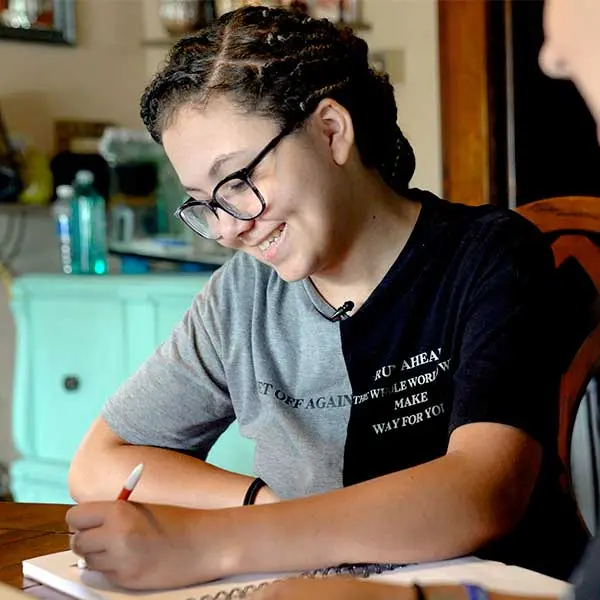Lily’s Story: From a Broken Ankle to Help with Teen Depression
See how an Emergency Department visit for a broken ankle led to Lily receiving the mental health support she needed.

Nov. 6, 2025
Speaking Up About Mental Health
When 13-year-old Lily came to the Emergency Department at Children’s Nebraska for a broken ankle, she didn’t expect to talk about her mental health. But she’s glad she did. During her visit, she filled out a routine patient health questionnaire (PHQ). It’s a 10-question survey that assesses the mental health of adolescents.
“I remember a few of the questions were like, ‘How are you feeling?’ and ‘Do you self-harm, or have you ever attempted?’” Lily says.
Because she was in pain from her fracture, she didn’t hold back — she answered the questions honestly. The results pointed to signs of teen depression. She needed help.
Treating the Whole Person, Physically and Mentally
After Lily completed the depression and suicide screening, she worked with social workers from the Emergency Department to establish a safety plan. Then, they made sure she was attending regular therapy sessions, with a goal of supporting Lily’s mental health long-term.
“There’s nothing more important,” says social worker Shana Romero, LCSW. “A broken ankle can heal. You put a cast on it, and the kid is doing great. But untreated mental health or depression can follow a child for life, and there’s so much intervention and health that can be brought to that situation.”
Children’s aims to treat the whole person, both physically and mentally — and help patients realize that asking for help isn’t scary. Lily received care for her ankle, but also a sense of hope and healing for her mental health.
“I feel better about opening up to people,” she says. “It makes me feel better that people know what I’m going through and can help me.”
Caring Contacts Gives Continued Encouragement
Lily’s connection with Children’s social workers didn’t stop after she left the hospital. Through the Caring Contacts program, they stayed in touch, checking in with her regularly.
“Caring Contacts is a magical program,” explains Sabrina Schalley, LCSW, director of Behavioral Health Integration. “It’s a simple concept of sending patients handwritten notes from the person who did their mental health assessment to say, ‘We still care about you. We’re rooting for you. Keep on the path, and it’ll be worth it.’”
Caring Contacts started at Children’s in 2020, though the concept dates to the 1970s, when it was used in the adult population and substance misuse. Children’s is the first hospital in the country to use it as an intervention to support pediatric mental health. To date, more than 1,400 pediatric patients experiencing suicidal ideation have been part of the Caring Contacts program. The Behavioral Health & Wellness team also has helped expand this program beyond Children’s.
Over the span of 12 months, teens like Lily receive six handwritten cards with encouraging messages from social workers. The notes often include stickers and other resources.
“It’s kind of like having an angel, knowing that there’s somebody who genuinely cares about your child,” says Lily’s mom, Karen. “It means the world to me.”
A year later, Lily is in a good place with friends and family, expresses herself through creative drawing and knows that meaningful messages are always within reach.
“I usually keep the cards on my dresser, where I can see them,” Lily says. “If I’m feeling sad, I can read them, and I feel better.”
What is Teen Depression?
The depression Lily experienced is common in teens. The American Academy of Child & Adolescent Psychiatry (AACAP) estimates that every year, one in seven teens has depression. Signs of depression can include:
Using drugs or alcohol
Sleeping too much or too little
Eating more or less than usual
Spending a lot of time alone or avoiding friends and family
Losing interest in activities they used to enjoy
Lack of motivation or not wanting to do things
Frequent anger, irritability, or outbursts
Feeling sad most of the time
Expressing hopelessness or negativity about the future
Low self-esteem or negative self-talk
Trouble focusing, remembering, or completing tasks
Falling behind or struggling in school
Overreacting to criticism
Risky or aggressive behavior
It can be hard to recognize signs of depression, but it’s important to normalize when children and adolescents, like Lily, speak up. Behavioral health problems can affect anyone and often impact an entire family.
The Future of Mental Healthcare at Children’s
Lily’s story is one example of how mental health and physical health intertwine. If your child is struggling, help is right here at Children’s.
In 2026, our Behavioral Health & Wellness Center will provide a first-of-its-kind facility in the region. The Center offers a full spectrum of pediatric mental health services for — giving young people hope, help and healing.
Explore More
For additional support with anxiety disorder, depression or other mental health concerns, contact Children’s Behavioral Health team.

